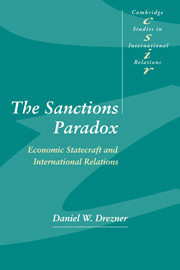Book contents
- Frontmatter
- Contents
- List of figures
- List of tables
- Acknowledgments
- 1 Introduction
- Part I Theory and data
- 2 A model of economic coercion
- 3 Plausibility probes
- 4 Statistical tests
- Part II Economic coercion in the former Soviet Union
- Part III Choosing between carrots and sticks
- Part IV Conclusion
- References
- Index
- Cambridge Studies in International Relations
2 - A model of economic coercion
Published online by Cambridge University Press: 15 January 2010
- Frontmatter
- Contents
- List of figures
- List of tables
- Acknowledgments
- 1 Introduction
- Part I Theory and data
- 2 A model of economic coercion
- 3 Plausibility probes
- 4 Statistical tests
- Part II Economic coercion in the former Soviet Union
- Part III Choosing between carrots and sticks
- Part IV Conclusion
- References
- Index
- Cambridge Studies in International Relations
Summary
This chapter develops a theory of economic coercion that incorporates conflict expectations. The goal is to answer the questions raised in chapter 1. When will countries threaten economic coercion? When will the targeted countries concede? How large will their concessions be?
All models start with assumptions. This chapter starts by elaborating the two substantive assumptions made in this book. First, governments act as rational unitary actors. Second, states that anticipate frequent political conflicts will be more concerned about the distributional and reputational effects of influence attempts in the present. When actors expect future disagreements, they will care more about the relative distribution of political assets, and more about their reputation for toughness. Because adversaries anticipate more clashes than allies, alignment is a useful empirical measure of conflict expectations.
The chapter then develops a simple extended-form game of economic coercion. The model shows that the strategies of the two countries depend on the opportunity costs of a stalemate outcome and the expectations of future conflict. As the target country's opportunity costs of deadlock rise, sanctions are less likely and less useful. Conflict expectations have a contradictory effect on economic coercion. On the one hand, when both countries anticipate numerous disputes, the sender will be more likely to use economic sanctions as a foreign policy lever. On the other hand, the target's expectation of frequent conflict will reduce the magnitude of its concessions.
- Type
- Chapter
- Information
- The Sanctions ParadoxEconomic Statecraft and International Relations, pp. 27 - 58Publisher: Cambridge University PressPrint publication year: 1999



